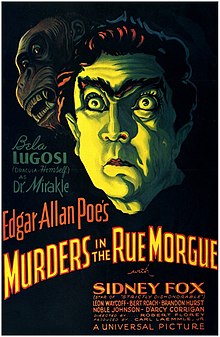| Murders in the Rue Morgue | |
|---|---|
 Theatrical release poster by Karoly Grosz[1] | |
| Directed by | Robert Florey |
| Screenplay by | |
| Based on | "The Murders in the Rue Morgue" 1841 story by Edgar Allan Poe |
| Produced by | Carl Laemmle Jr. |
| Starring | |
| Cinematography | Karl W. Freund[2] |
| Edited by | Milton Carruth[2] |
Production company | |
| Distributed by | Universal Pictures |
Release dates |
|
Running time | 62 minutes[2] |
| Country | United States[3] |
| Language | English |
| Budget | $186,090 |
Murders in the Rue Morgue is a 1932 American horror film directed by Robert Florey, based on Edgar Allan Poe's 1841 short story "The Murders in the Rue Morgue". The plot is about Doctor Mirakle (Bela Lugosi), a carnival sideshow entertainer and scientist who kidnaps Parisian women to mix their blood with that of his gorilla, Erik. As his experiments fail because of the quality of his victims' blood, Mirakle meets with Camille L'Espanye (Sidney Fox), and has her kidnapped and her mother murdered, leading to suspicion falling on Camille's fiance, Pierre Dupin (Leon Waycoff), a medical student who has already become interested in the earlier murders.
Florey had suggested adapting Poe's story as early as March 1930 but he was only attached after being taken off Frankenstein (1931). Only a few elements of Poe's story remain in the script by Tom Reed and Dale Van Every; much of the story was changed to accommodate a role for Lugosi. Florey left the project but returned, arguing with Universal about elements such as period setting. After production wrapped on November 13, 1931, it was brought back into production for five days of reshoots and reordering of scenes in the final edit.
The film was first shown publicly in New York on February 10, 1932, and its wide release was censored throughout North America. The authors of Universal Horrors described initial reviews of the film as "harsh" while later reviews from historians and home video reviewers were lukewarm. The film led to other Poe stories being adapted by Universal Pictures; it was also the first to have Lugosi in a role of either a mad scientist or a doctor, roles he would reprise later in his career from The Black Cat (1934) to Bride of the Monster (1955).
- ^ Nourmand & Marsh 2004, p. 179.
- ^ a b c d Weaver, Brunas & Brunas 2007, p. 47.
- ^ "Murders in the Rue Morgue". American Film Institute. Retrieved January 15, 2020.